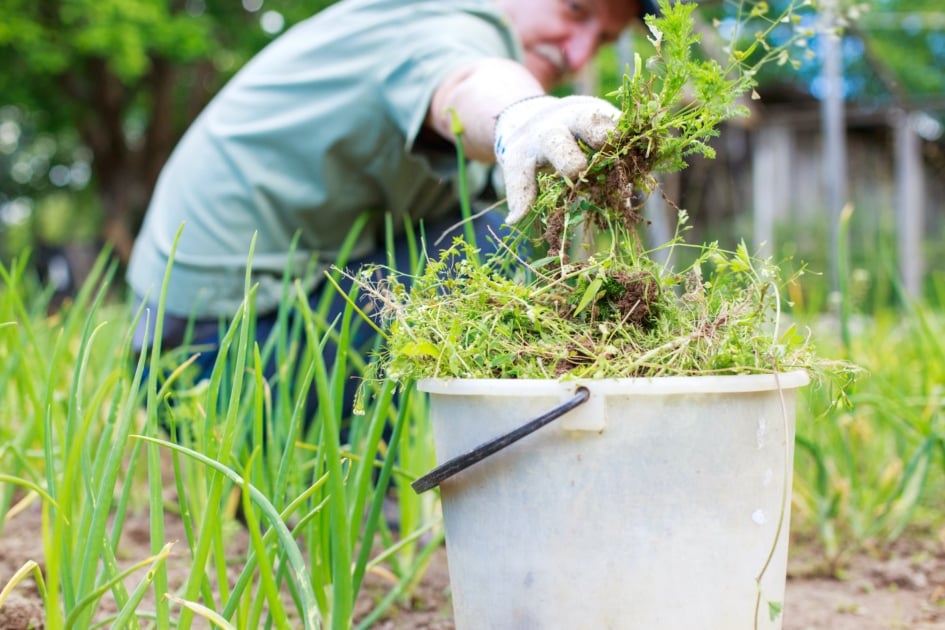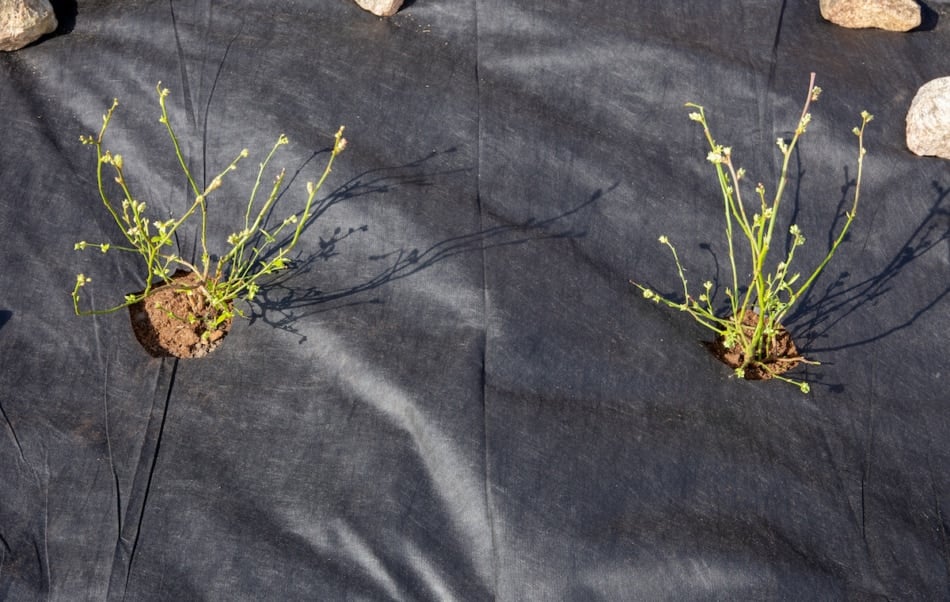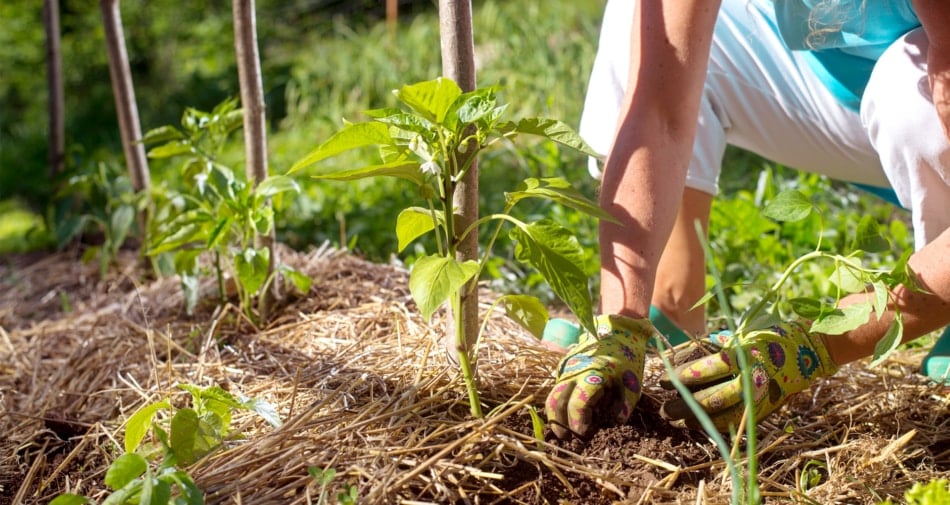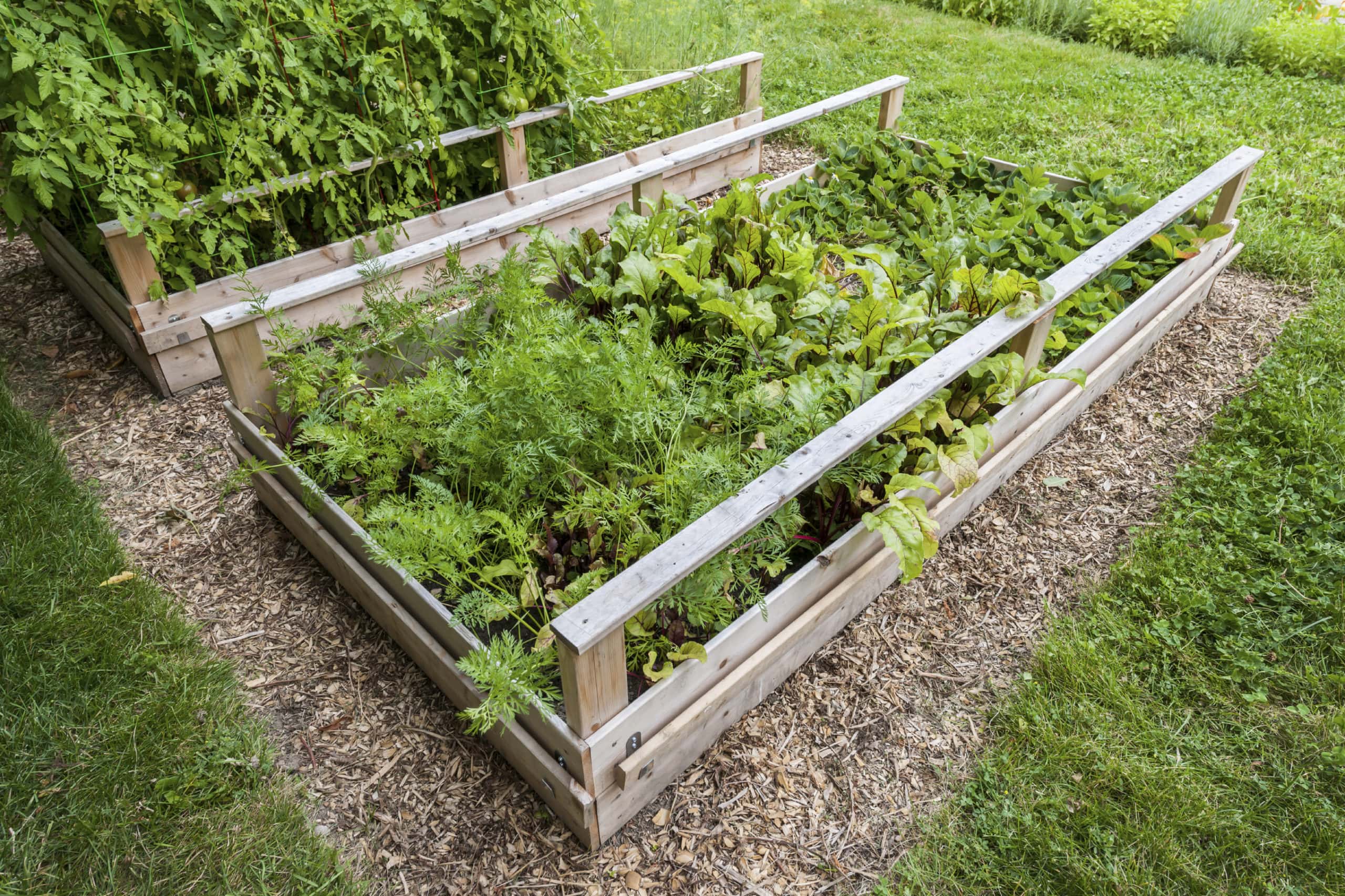7 No-Fail Ways To Win The War on Weeds!
Tired of duking it out with weeds in your garden beds? Be victorious with these all-natural strategies!

Year after year, we fight the same fight. No sooner than we pull all the weeds, new ones sprout right behind them. If you’re tired of the frustrating battle against the weeds popping up in your gardens, here are a few all-natural strategies to keep your gardens weed-free all year long.
Try These 7 No-Fail Strategies
1. Corn Gluten Meal
This is one time you may not want to go gluten free! Many university studies show corn gluten meal to be an effective pre-emergent herbicide (a pre-emergent prevents seed germination). It is an all-natural alternative to synthetic pre-emergents and it has no known ill effects for human health or the environment. Since corn gluten stops seeds from sprouting, make sure that you don’t use it in any spot where you’d like to plant seeds within the next year or two.
Where to buy: available at any garden center or online.
2. Weed Barriers

Weed barriers are a no-fuss way to keep weeds out of the garden for years to come. You can use weed barriers in vegetable gardens, but because you might change your plantings around from year to year, this means that you may have to replace the weed barrier yearly.
Where weed barriers really stands out is in permanent perennial beds. Lay the sheeting down, making sure to cut holes wherever you plan to place landscape perennials, and then cover the fabric with mulch, grass clippings, fall leaves, or something else to hide the plastic or fabric sheets.
Where to buy: At any home improvement store, garden center, or hardware store.
3. Newspaper and Cardboard
Many gardeners would rather keep plastics out of their gardens. If this sounds like you, then try recycling newspapers and cardboard as weed barrier instead. The advantage to these two materials is that they’re readily compostable, which means that you can easily till them into your vegetable gardens and reapply each year.
If you decide to use newspaper, make sure to avoid toxins by using non-glossy pages and black and white ink. Today, the vast majority of newspapers use organic soy-based black ink, which is safe for your gardens.
4. Mulch

Tree bark mulch wood chips are old standbys for weed management, and they can be used on their own or as a covering for your weed barrier of choice. However, store-bought bark and wood mulch isn’t your only option. Grass clippings and straw can be used as mulch, so long as it is relatively free of weed seeds. You can also use whole or shredded tree leaves as mulch.
A couple of particularly stubborn weeds may still grow through your mulch of choice, but far fewer than will grow on bare soil. In addition, no matter which type of mulch you use, you’ll be adding nutrients to your garden beds and you’ll increase the soil’s ability to retain water.
5. Go No-Till
When you till the soil, you’re essentially planting weed seeds that were once laying on the surface of the bed. In addition, you’re exposing any previously buried weed seeds to that ray of sunlight they need to sprout. As such, no-till gardening is a great way to reduce weeds in your garden — and save you the countless hours you spend tilling each spring!
No-till gardening works especially well when you allow a layer of organic material to cover the surface of your beds. This layer can be mulch or it can be last year’s foliage. Either way, if you adopt this gardening method, you’ll wind up with fewer and fewer weeds each year.
6. Pack Plantings Tightly
One of the best ways to keep weeds out of your gardens is to not give them any room to grow. We all love to see some space between our plantings, but if you can pack your plants instead — or use groundcovers to choke weeds — then you’ll never need to worry about weeding again. As a general rule, this tactic works best in landscape plantings since many vegetable plants need quite a bit of space to mature.
7. Off with Their Heads!
It happens to the best of us — life gets in the way and before you know it, weeds have grown up and long since bolted. As the old saying goes, “One year’s seeds, seven year’s weeds.” Therefore, before you start ripping them out of the garden, however, gently clip off the seed heads so that you don’t scatter the seeds in your garden as you pull the weeds.
There are many weed-busting strategies, but these are some of the most effective. Give them a try, and you’ll find yourself spending a lot less time weeding and a lot more time enjoying your gardens.
Do you have an all-natural weed strategy you want to share? Tell us in the comments below!

Amber Kanuckel
Amber Kanuckel is a freelance writer from rural Ohio who loves all things outdoors. She specializes in home, garden, environmental, and green living topics.








Check out “Square Foot Gardening” . Mel Bartholomew had some great ideas. Little to no weeding. Great for areas with poor soil.
We love the idea of gardening in close quarters! Thank you for the recommendation!
How do you get rid of the dreaded Bamboo!
Jacqueline,
We had a bamboo problem several years ago and we found that if we let it come up and get between 6-9″ high we could then go “kick” it out of the ground and get roots and all. It will take over quickly if you don’t stay on top of it, as I am sure you well know. Good luck!
What kind of weed is it that attacks trees and drain all the life out of them? How do you get rid of them?
Hi Melony,
This sounds like more than a weed, but your best bet would be to go to your county’s extension center or to contact a local nursery. Hope they can help.
Probably winter creeper…
What about Canadian Thistle? Every time I pull it up more comes up. Last time (a few weeks ago) I cut it instead of pulling it and covered it with cardboard, but it is now pushing up the cardboard.
Hi Janice,
Here is a great article that may offer some tips –https://www.gardeningdream.com/how-to-get-rid-of-canadian-thistle/ Some weeds do seem indestructible! Good luck!
I bought a ground cover and planted it between the rows of my raised beds. it’s taken several years but it has spread and looks beautiful and NO WEEDS!!
I found that during or after a rain when the ground is good and soaked, I can get out there and start hand pulling weeds and grasses mostly with ease. They seldom break off leaving a buried root behind. I also plant staggered double rows about 18” apart. This allows me to get between my rows with a tiller if I need to. I do this early in the day so the sun will dry out the newly exposed weed roots. Some people I know just mow between the rows to keep the weeds and grasses trimmed down.
I generally use vinegar for weed control, cardboard or newspaper covered with mulch renewed each year. Dish soap can be added to make it “stick” to leaves a little better. I also utilize shredded paper when I have it. It breaks down easily.
My biggest problem in my back yard has been Bermuda grass. I have been fighting it for a while. I have shrub, small trees and perennial beds in the backyard with zoysia grass in several areas. I have one area of Bermuda that I have sprayed several times and recovered with cardboard and plastic each time. This has been the most successful, but it is tedious and I doubt that the Bermuda is eradicated. I believe getting rid of it will always be an ongoing battle.
Anyone have a magic bullet to destroy Bermuda?
The only way to kill Bermuda grass is glyphosate .I hope I got that right. Even if I didn’t it is the active ingredient in round-up. Keep in mind it will kill everything it’s sprayed on. I have used it in close proximity to shrubs and flowers without harming them,but be sure there is NO wind. If u do this in the fall u can reseed your grass after a couple of weeks. There is a %limit of glyphosate that will kill Bermuda and still allow you to reseed. I cannot remember what it is. Contact your local county extension office. They can give u all the info u need !
Wish u success!!! I hate Bermuda grass!
How do you kill old English ivy naturally
Vinegar will usually kill just about any plant and it’s usually harmless to most animals. It will kill most plants if you spray it on the leaves. Tear out what you can and keep spraying the sprouts. If you have to cover it with plastic to keep the vinegar from dissipating too fast, put some weight on it as well. If you have to resort to concentrated vinegar or more drastic means, replacing your soil or adding clay, baking soda, and cornmeal gluten can change the PH enough to discourage growth. Don’t add baking soda while the vinegar is active. Maybe wait until next year to see if you’ve got it under control.
* If you add cornmeal gluten, don’t plan on growing any seed there for a couple of years.
Thanks I have a lot of ivy and heavenly Chinese tree starts to kill. They’re very prolific they grow from roots and seeds.
Thanks for the info really appreciate it❤️
Glad you found the information useful, Catherine. Thanks for taking the time to write.
Clipping invasive Alyssum is a chore for us on acreage, any benefit to continuous weed removal by hand for Alyssum? Or beneficial removal alternatives? In spring it is ‘fun’ to see them come alive like the dandelions but soon won’t have the time.
Urban Gardens love Alyssum. Why not use Craigslist to invite folks out to get free seed and transplants? Have them bring their own shovel and container, extra plants or preserves for trade. Daisies in a pasture that may give livestock a tummy ache may be a delight in the city, so point to any you want them to dig if they like em!
Goat Rental is a craze in Western TN. We have lots of privet, kudzu, honey suckle that is growing in farmlands.
“Goats for Hire” has helped several around here to rid.